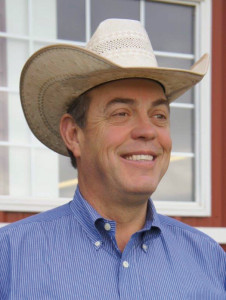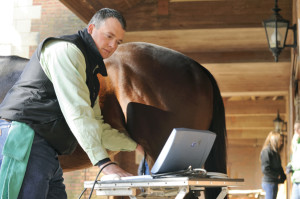The Great Vaccination Debate
“When they could eat no more, they pawed shallow wells with their hooves for drinking water. Then, they rolled in the wiry grass, letting out great whinnies of happiness. They seemed unable to believe the island was all their own. Not a human being anywhere. Only grass. And sea. And the wind.”- Marguerite Henry, “Misty of Chincoteague”
Click here to read the complete article
by: Delores Kuhlwein
 Even though they are far removed from the ponies of Chincoteague, we all wish for a worry-free life for our beloved horses. Protecting them to the best of our ability; keeping them safe, sound, and healthy; and letting them live moments representative of the joy penned by Henry remains our goal. Since our animals often become part of our family, our knowledge about human health care may lead us to draw some conclusions about our own horses.
Even though they are far removed from the ponies of Chincoteague, we all wish for a worry-free life for our beloved horses. Protecting them to the best of our ability; keeping them safe, sound, and healthy; and letting them live moments representative of the joy penned by Henry remains our goal. Since our animals often become part of our family, our knowledge about human health care may lead us to draw some conclusions about our own horses.
When the widespread infant vaccine controversy and anti-vaccination movement became big news in the media, the topic of equine vaccines soon followed. Are current equine vaccination protocols a cause for concern, from a veterinary standpoint, or do we risk a lot more by not vaccinating?
To answer these questions, The Equine Chronicle consulted with top veterinarians across the U.S. to get some straight answers on both sides of the issue: Mark DePaolo, DVM, of All Star Equine in Pilot Point, Texas; Alan Donnell, DVM, of Equine Sports Medicine in Pilot Point, Texas; and Jeremy Whitman, DVM, of Equine Medical Associates, PSC, of Lexington, Kentucky and the Resident Veterinarian at Hill’N’Dale Farm in Lexington.
Traditional Approaches to How We Vaccinate Today
The way we vaccinate our horses in the 21st century reflects a basic, time-tested practice, based upon research, circumstances, and vaccines that are available and in use. Donnell explains, “Annual and semi-annual vaccination protocols have been established depending on the disease we’re trying to prevent. For example, annual protocols are set up for Encephalitis, Tetanus, and Rabies. Semi-annual protocols are routinely set up for Rhinoneumonitis, Influenza, and Strangles. Semi-annual or annual West Nile protocol depends on the vaccine being used. With high performance horses, Thoroughbred racehorses for example, Rhino flu vaccines are administered quarterly.”
Whitman elaborates and emphasises the consideration of different circumstances. “Each horse exists under a different set of circumstances that dictates the ideal vaccination strategy. These circumstances include geographic location, use, disease prevalence in the environment, etc. Seasonal variability to disease presence is another factor that dictates vaccination timing. A good example is with the viral encephalitic diseases—WNV, EEE and WEE. For most of the US, these antigens are given as yearly boosters.
“But, in Florida and some other more southern climates, it’s common to booster for these diseases two times per year. This is due to the higher disease risk these animals experience in this climate due to year-round mosquito exposure. The frequency and timing is dependent upon these variables as well as the immune response elicited by the vaccine. Only a few of our current equine vaccines have data describing their duration of immunity. Two of these products, West Nile vaccines and Rabies vaccines for horses, do have data that has demonstrated a year-long duration of immunity. Much of this is a direct result of the requirements of the USDA for the licensure/approval of these products. (USDA is the regulatory body which oversees the development, testing, and licensing [approval] of vaccines used in veterinary medicine).”
New Approaches to Vaccine Protocol
However, DePaolo, sees a parallel between horses and other mammals, so his recommendations to clients differ when it comes to frequency.
“When you understand that a horse’s immune system is similar to that of other mammals, such as dogs, cats, and humans, it can be reasonable to determine that the annual or semi-annual vaccine protocol may not be necessary. Recently, the AVMA changed their vaccination recommendations for small animals from annually to every three years, which is headed towards a much more common sense vaccine protocol, in my opinion,” he explains. “I recommend that my clients vaccinate their horses similar to how they were given shots as children. Horses should receive the core vaccines when they are young. After that series, cellular immunity should last for a lifetime. I believe that horses should have a tetanus booster only when they get a serious cut or puncture wound.”
He encourages education on the specifics of vaccines, so owners can make wise decisions, whether they do their own vaccinating or work with a veterinarian. “Understanding the efficacy of the vaccines is also critical. For instance, the Rhino vaccine may offer protection against the respiratory symptoms of the infection. However, it provides NO defense for the neurologic form of the disease. Also, the vaccines against Potomac Horse Fever, Strangles, and West Nile Virus are only partially successful in preventing infection.”
“The repercussions I mainly see in my practice are due to over-vaccinating,” DePaolo warns. “Every spring and fall, I have patients dealing with stiff necks, going off feed, laminitis, allergies, and neurologic disease shortly after receiving shots. Oftentimes, owners will not realize these health issues are due to vaccinosis until it happens two to three times shortly after administering vaccines. The horse’s immune system will be much stronger if a vaccination protocol similar to humans is followed. The body, particularly the immune system, is designed to store the ‘blueprints’ for antibodies to diseases that it has been exposed to for the life of the animal. This very beneficial ability is called cellular immunity.”
 Customizing Vaccination Programs
Customizing Vaccination Programs
The idea of treating each horse individually also resonates clearly with each veterinarian when deciding how to vaccinate, especially when one considers factors like degrees of exposure.
“A competitor going coast-to-coast on a vigorous show schedule would have a different vaccination program than an individual turned out in the pasture,” Donnell points out. “The basic vaccinations are the same for both horses. The on-the-road horse is challenged by regional outbreaks and stress, therefore, it requires more help.”
“It’s imperative to develop a relationship with a credible veterinarian to tailor a protocol to each owner and their animals,” Whitman recommends. “Vaccines stimulate the host’s immune system to combat diseases encountered in the environment. This can lead to elaborate vaccination protocols in some populations, such as Thoroughbred mares in intensive breeding operations or sport horses that haul heavily. These individual needs vary greatly from the adult horse that’s pastured and doesn’t come into contact with a transient population. Some disease risks are regional or geographic in nature; an example of this could be anthrax. This is a rare disease, but in very specific, predominately western geographies, there is a need to vaccinate horses. Still, most equine veterinarians will never use a single dose of this vaccine in their entire careers if they practice outside these very well-defined, anthrax-endemic areas. This demonstrates the variety of needs in the species.”
DePaolo adds to consider side effects as well as other factors when working with your veterinarian on a plan. “Like all aspects of sensible horse care, vaccination should not garner a one-size-fits-all approach. Special attention must be paid to several factors including a horse’s age, likely exposure, and overall physical condition. Vaccines are not without negative side-effects. It’s important to remember that an unhealthy horse should NEVER be vaccinated – inserts included with vaccines state this in writing. This includes, but is not limited to, health issues like Cushing’s, allergies, respiratory tract infections, sarcoids, laminitis, and ulcers. It is important for horse owners to understand that vaccines will cause immune compromise for close to three weeks following administration. Protective immunity will not take effect for about 21 days, so make sure to plan ahead when traveling. Never vaccinate in the face of an outbreak, as you will just be weakening the immune system at the time it needs to perform at its best.”
The Mercury Scare
When it comes to determining whether mercury is a threat, the conclusion is still just as divided with respect to horse vaccines as the human controversy.
DePaolo points out the reality of what is present in vaccines that had so much of the public provoked recently, and many questions still linger. “Mercury is the most potent neurotoxin known to mankind. However, it is still used in all-killed virus vaccines for horses, under the name Thimersol. The immune system is primarily composed of nerve tissue. Therefore, one of the first things to be compromised by excessive vaccinations is the immune system, due to the neurotoxic effects of the mercury-based preservative,” he says.
Yet, Whitman indicates that Thimerosal is used in very small amounts in a number of equine vaccines, acting as a preservative just like for human vaccines. “Certainly this is a concern that has developed in recent years. It very likely did stem from similar concerns with human vaccines—especially given to children. The concern was that Thimerosal contributed to autism. To address this concern on the human side, all of the available literature regarding the use of these vaccines in children was analyzed by a panel of experts. The unanimous conclusion of this review was that there was no evidence to indicate that vaccinating children with vaccines that contain small amounts of Thimerosal had any impact on the development or incidence of autism,” he affirms.
“Likewise, in horses, there is no evidence that the use of Thimerosal as a preservative in equine vaccines contributes to any type of negative, long-term health effects. My clientele does not have any safety concerns regarding mercury in horse vaccines,” Whitman says.
“There continues to be an ongoing debate in human medicine concerning possible harmful effects of this mercury compound,” Donnell adds. “Given the low number of equine vaccines that contain Thimerosal, the concerns are negligible.”
What Else Is New?
As times and research evolve, as well as insight through field experience and exposure to new discoveries, some of our routines change along the way, too.
For Donnell, he notes that vaccines have changed with the times as a benefit to the comfort and ease of treatment for the horse. “One change in practices in the industry is the combination vaccine. One injection – six vaccines! These simplify the process, and the horse appreciates one needle stick,” he adds.
Changing times need to be accompanied by our need for awareness and diligence as well, according to Whitman. “It’s most important for us to stay ahead of emerging diseases and changes in available vaccines from a variety of manufacturers,” he explains. “West Nile demonstrated that a disease does not necessarily stay in one geographic location, and we must anticipate our patients’ needs before being confronted with a new or re-emerging pathogen. West Nile traveled across the country over a three-year period and caught many off guard.”
Time has also brought an additional point of awareness for DePaolo. “A big ‘Ah-ha’ moment for me was when I was vaccinated for rabies (as is commonly the case with large animal vets) and had my second booster. I was informed that I was ‘covered for life.’ If I never needed another Rabies booster after having my initial series, why did my horses need to have shots every single year for the rest of their lives? It didn’t make sense! That experience and a few others have lead me to adopt a much more common sense approach to the protection of my patient’s immunity,” he reveals. “Please don’t get me wrong, I’m not anti-vaccine! I’m all for a more common sense approach to immunizations and then encouraging our horses to have their own immunity through proper nutrition and gut health.”
Regardless of the stand you take on the vaccination debate, all three of these veterinarians strongly agree that administering certain vaccinations is an absolute necessity. “The absence of an appropriate vaccination regimen can lead to an untimely demise or a potential decreased quality of life,” Whitman says. “The death of a horse to a preventable disease is a heavy burden. This, coupled with the economic impact of a missed show or a lost foal, due to a poorly vaccinated broodmare, should provide enough motivation for each owner to develop an appropriate vaccination protocol with their veterinarian.”
Since some vaccines are tried and true, they come highly recommended by each vet. “Overall, vaccinations for our equine patients are a necessary thing. There are some vaccines that have 99% efficiency, meaning complete protection from the disease. An example would be Tetanus. Other vaccines that are highly efficacious are Encephalitis and Rabies. In my opinion, all horses should be vaccinated for Tetanus, Eastern and Western Encephalitis, and West Nile virus annually,” advises Donnell. “We see injection site reactions and sometimes horses get sick when they have had a vaccination for a certain disease. Our take home message should be to take care of your horse as well as possible. Consult with your veterinarian to customize a vaccination program for your horse.”
DePaolo agrees with the same core vaccines, again, depending on individual factors. “I believe that horses should only be immunized against Tetanus, Rabies, Eastern Equine Encephalomyelitis, and Western Equine Encephalomyelitis – the final three should only receive vaccines if they live in endemic areas. I recommend that horse owners go online to their state veterinary website or the CDC website and research the actual number of cases of a particular disease, prior to blindly vaccinating,” DePaolo says.
Whitman suggests another online resource that’s easily accessible for horse owners. “The American Association of Equine Practitioners has a great resource for veterinarians and owners in the Vaccination Guidelines section of their website. This can be found at AAEP.org. Owners should seek a knowledgeable veterinarian to develop a protocol for their horses.”
Wherever you land on the vaccination debate, one thing is clear. Entrusting a veterinarian to work with you and your animals to provide the best protocol for your program is crucial. Because, after all, giving your horse the best care possible, while improving their quality of life and providing a dose of happiness along the way, is what it’s all about.
Our team of experts:
Mark DePaolo, DVM, received his veterinary degree in 1994 from Oregon State University and Washington State University. He began specializing in Equine Chiropractic and Osteopathy in 1997. Then, he studied Acupuncture at Colorado State University in 2000. Complementary medicine and nutrition has been his passion for more than 15 years.
Jeremy L. Whitman, DVM, Equine Medical Associates, PSC, is a 2002 graduate of the University of Tennessee. He practiced for three years at the Four Sixes Ranch and has resided in Lexington, KY for the past 10 years. Dr. Whitman is a partner at Equine Medical Associates, PSC and the resident veterinarian at Hill’N’Dale Farm in Lexington. He currently practices predominantly on Thoroughbreds and performance horses.
Alan D. Donnell, DVM, is a thirty-one year veteran of equine practice, graduating veterinary school at Oklahoma State University in 1984. His knowledge and insight of sports medicine and lameness has advanced his practice to the forefront of many in the equine industry. Along with practicing in Pilot Point, TX, he attends numerous horse shows across the country and in Europe, including the last four World Equestrian Games.











